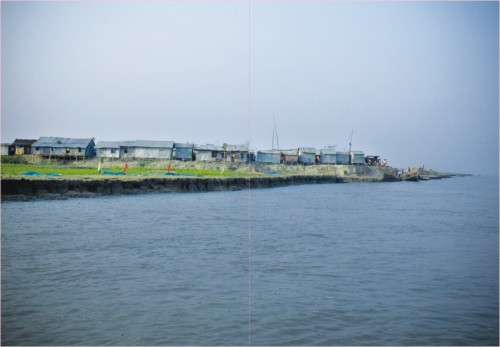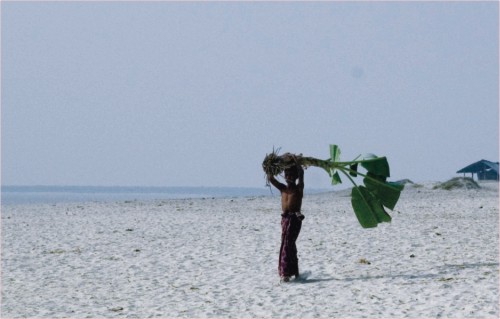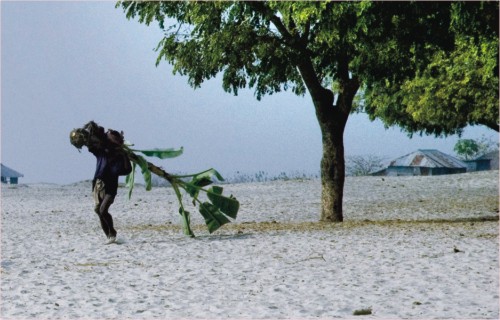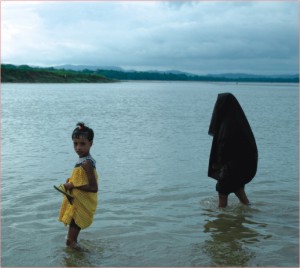
Inside
|
Stopping the Sea: Can We Ever Find a Solution? Afsan Chowdhury examines the complexities of climage change and what can be done Man-made climate change didn't begin last summer. Its apocalyptic journey started with the first smoke belching chimneys of the UK's industrial revolution several centuries ago. Climatologists say it's the UK that has contributed most greenhouse gases into the atmosphere and not the popular villain, the US, with its shorter industrial history.
So we are at the final lap, if one will, of a long history of nature- ravaging. First out of ignorance, then denial, and finally at this latest stage, of deliberate selfishness. It has taken several hundred years not only to pile up the gases, but also to set up the socio-economic infrastructure and mindset that resists effective solutions to what many think sound the bell to an impending global disaster. Finding a solution in a few years is likely an impossible task. Having said that, let's also confirm that we are all tired of hearing dire predictions, especially about Bangladesh, which has become a major techno-media business of selling shock. For example, saying that one-third of Bangladesh will be wiped out is actually no more shocking than saying half of Bangladesh will drown. Whether the IPCC says that such catastrophes will generate 20 million refugees or dissenting experts suggest that the number will be closer to fifty million, doesn't have an impact because the audience has shut their ears to serial bad news of the climate variety. Our senses are numbed so we can't register the disaster that is already upon us and therefore also can't act. But suppose we did want to act, what would we do? I am afraid that is where the real bad news is -- because not much time has been spent thinking about that topic. Some reports have been prepared and discussed at seminars and all that, but as anyone will notice, climate change is one of the lesser priority topics -- and apart from demanding more foreign aid, little has been done. In effect, we are thus simply waiting for the same West to tell us what we are supposed to do. And we can't make them give us resources either, although it was decided at the 2007 UN Bali summit that several funds would be placed at the disposal of the highly affected countries. Global warming: None of these are global warming related, but what will happen is that all of these will be heightened and each, coupled with climate change, will be capable of choking us to death. So to talk of sea level rise in Bangladesh is actually to describe the crisis in somewhat "Western crisis" terms, because even if the sea didn't rise at all, we would still drown in our massive environmental problems. When one talks of solutions, some think of building dams to stop the rising sea, but it seems that warming and water shortage, largely as a result of the drying of the Himalayas caused by ice melts, will cut food production by perhaps as much as 30% -- and could be more destructive than rising waters. It will be the largest ever assassination of livelihoods. Now these issues are not a secret, and our policy-makers know this well, but there has been very little concrete effort to do something about them. Clearly, types and patterns of crops will have to be adjusted and habitation areas relocated and new livelihood will have to be discovered at a scale never done before, but nobody has told or discussed how. That sense of emergency is certainly missing. We would therefore say that along with global warming, our greatest threat is our own governance system which is supposed to take care of disaster situations. Just like climate change took a few hundred years to happen, our state has managed to reach this pathetic state in the last 40 years along with the legacy of the Pakistan era. Where is the solution industry?
Unfortunately, this is part of our traditional disaster industry, and one supposes a new growth sector has opened up. There is no problem with that, but it would be foolish to assume that anyone is speaking of managing the crisis at a level that will make a large-scale difference to Bangladesh. This is where a partnership of the government, academia, and NGOs can come in -- but that is hardly happening. It is partly because the governments in our country, whether kurta or khaki clad, are not known for their problem solving capacity. Given the scale of the crisis, they appear, at best, as Sunday politicians without a stake in the corporate future. The solutions are not really difficult to find, but implementing them is another matter, doing that which is not part of any track record. Worse, they are truly mega-solutions, and one isn't sure if the state is capable. To this is added the sobering fact that not a whole lot can be done given the present scenario. Countries which are expected to weather the coming days are the economically better off ones, and impoverished Bangladesh is not one of them. Poverty will be the tunnel through which global warming will attack, and in Bangladesh that translates into condemning millions of lives. For us, agricultural decline will be critical, so we do need to look into options and alternatives, and some work has already been done but has not been disseminated widely, nor taken up by the authorities. It's a good indicator about how much we care about solutions.
New problems, old imaginations Some of the problems that are just beyond fixing include our population size, which is supposedly a resource according to many. Since nobody explains what resource that is, unless one thinks of guest working, which is already tottering, we are, by any account, too many. Political correctness prevents most from saying that this is a problem. While the West does think that populations are a bigger problem than climate change and it can be blamed for resource shortages in the poorer South, too many people chasing too little resources is a fact, too. One may argue about the genesis of the problem, and contest the entire text of the Western argument, but some place in between, there is a problem we haven't been able to handle, creating millions of vulnerable people. The perplexed West and the solution crisis
The recent oil price rise and its attendant disturbances, including food shortages leading to social disorder, has finally exposed the level of global vulnerability never discussed or thought of before that the West faces. Climate change and oil shortage both mean an unacceptable shift in living standards and lifestyle change. It also hints at livelihood difficulties, because low carbon consumption means job losses (as high oil price did as people shifted from trucks and SUVs). The latest crisis has shown that oil is running out and to the West, climate change is about adjusting to oil shortages and not the end of mankind. Western anxiety about the economic rise of China and India is perhaps more disturbing to them than anything else, including global warming, because they consume scarcely available oil and not because they emit greenhouse gas. The idea that other economies may also want carbon is too alien to the Western world. The West is almost totally unconcerned about the rest of the world, and all its thoughts are about preserving their lifestyle, now increasingly under threat. This is why it is possible to invest in bio-fuels when its effect on food prices is known and energy security essentially means freedom from importing oil and not "rational" spending. That's how India and China are behaving and that's how the rest of the world would behave if given a chance. The West has been planned and designed to function with cheap oil at the core of its sense of entitlement. The notion that the West is untouchable by the world's problems is so deeply ingrained that there are respectable scholars like Kissinger Professor of International Relations, Professor Russel Mead who says that -- good or bad policies -- the US appears to be immune to the vicissitudes of global going-ons. Against them are pitted the gloom and doom brigade who argue that the world has only 15 years more of oil supply at this level of carbon consumption, and the rate of increase in China and the West has introduced a new threat into equations of Western dominance and growth. As they face the unheard prospect of downsizing their economies because the oil price is too high, and the world is unable to sustain their high levels of carbon emission, they are also short of solutions, because much of what is being said are still not tested policies. It's also about saving industrial societies such as the US or China, and not just Bangladesh or Botswana which are the worst affected countries. Eyes wide shut If one observes the existing level of human suffering all over the world, it becomes clear that we are able to tolerate a very high level of other people's suffering, here and elsewhere. Climate change may well kill or harm millions -- perhaps even billions -- and I think if we know that we can't take care of them without risking our own life, we shall let them go where all do in the end. The ambushing of the global economy by oil price rise has brought home the connection between energy shortage and energy demand and the impact on life. It has shown that life as they know it in the West can crumble in weeks or months. That has made dramatic and ruthless decisions more probable. As for Bangladesh, our success in ignoring the plight of the poor in the last 40 years suggests that we are not serious enough about the measures needed to try to manage climate change. We have created the unbelievable legions of the poor and destitute and we don't have the resources to look after them. Why should we not be relieved if fifty million of these drop off like flies, and we can all blame it on the West? Photos: Amirul Rajiv Afsan Chowdhury is a journalist writing for Bangladeshi and South Asian publications. |
|



 Artificially depressed oil price has accounted for the huge economic growth of the post-WW II era, but the Arab-Israeli war of 1967 provided the first shock that low oil price was not a permanent fact. It has since then swung up and down, but long-term low oil price had rendered denial of the consequences of climate change possible.
Artificially depressed oil price has accounted for the huge economic growth of the post-WW II era, but the Arab-Israeli war of 1967 provided the first shock that low oil price was not a permanent fact. It has since then swung up and down, but long-term low oil price had rendered denial of the consequences of climate change possible. 